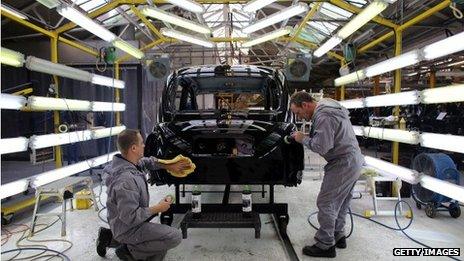Re-balancing and the re-industrialisation of Britain
- Published
- comments

The UK wants to re-balance its economy towards making things and selling more of its wares overseas.
As I travel around Beijing to cover the end (or at least the thawing) of the 14-month deep freeze marked by the visit of British Chancellor George Osborne, the Mayor of London Boris Johnson, and a number of high-level figures, I started to think about how both countries want to re-balance their economies but in different ways. It's certainly the term du jour.
For the UK, the government wants to re-balance the economy towards manufacturing and exporting more overseas, while relying less on, say, financial services given the banking bust of a few years ago. Manufacturing only accounts for around 11% of total valued added of what's produced in Britain, while the service sector accounts for over three-quarters of the economy.
For China, it's the opposite. It wants to re-balance its economy away from too much investment and towards developing a more diversified service sector to provide for its burgeoning middle class. China is worried about its high levels of capital spending, which has produced so-called ghost cities, and wants its companies to invest overseas instead — some of which will be going to Britain as announcements about Manchester Airport and other deals are expected this week.
In theory, these countries are largely complementary in what they want.
Trade deficit
Britain, which until recently exported more to Ireland than to the BRICs combined (Brazil, Russia, India, China), wants to re-orient more towards emerging economies and help its companies access the fastest growing markets in the world.
It begs the question: is the UK peddling the right stuff abroad?
Britain has run a trade deficit that widened precipitously last year when it hit a record high of £59.2 billion.
The hope was that with sterling having lost about a quarter of its value since the crash 5 years ago, it would have boosted exports in the same way that it did during the 1990s when the pound left the ERM (exchange rate mechanism) that had tied it to the Deutsche Mark. The last time that Britain had a trade surplus was towards the end of that decade in 1997 on the back of a depreciated pound.
Before then, Britain ran a current account deficit every year since 1984.
Notably, the deficit in goods trade grew since the late 1990s with further de-industrialisation of the economy. Manufacturing declined from contributing a quarter of GDP in 1980, to 20% during the 1990s and then fell sharply to 12% during the 2000s. Manufacturing still makes up about 20% of the German economy on the same value-added basis.
Exporting services
But, offsetting the overall trade gap is the export of services, which has been in surplus since 1966. And, it's a large surplus, typically around 5% of GDP.
Britain is particularly good at these activities and ranks only behind the US in terms of total exports globally. And it's not just financial services - but a range of business services including legal, accountancy, architecture, design, management consultancy, software, and advertising.
Furthermore, the trade in services tends to be relatively high valued-added. As global competitiveness is derived from quality rather than cost-competitiveness, margins tend to be higher. Because UK exports are increasingly represented by higher-end manufacturers and services, it might explain why the recent depreciation of sterling has failed to boost trade by as much as was hoped for. Price still matters, but perhaps not as much as it used to.
So, if the UK can get China to open up more of its services including in financial, professional and creative areas, then British companies are well positioned to serve the under-developed services sector in China.

British universities are expanding in China
One of Britain's problems is that the global trade in services, which it is particularly good at, has not opened up in the same way the trade in manufacturers has. Since World War II, the global trade in manufacturing goods has boomed as multilateral organisations such as GATT (General Agreement on Tariffs and Trade) and then the WTO (World Trade Organisation) have brought down tariffs and removed restrictive practices. The global trade in services though has not been liberalised to the same extent and this hurts Britain.
Playing your cards right
Where the trade in services has opened up, Britain tends to do well. Higher education is a good example of a UK service industry that is already successfully serving the Chinese market.
This is not just seen in growing numbers of Chinese students studying at British universities, but also through UK universities expanding into China and elsewhere through overseas campuses and partnerships with foreign universities.
It's why re-balancing the economy and re-industrialisation are easier said than done.
It's of course a long-term task and depends on a number of factors, and not just trade. There are some recent positive signs, such as an influential survey of purchasing managers, known as the PMI, finding that manufacturing output recently rose at the fastest pace in nearly two decades, since 1994.
But, in this respect, trade with China may not help.
Just this year, China overtook the US as the world's largest trading nation and the biggest manufacturer.
Trading more with China will mean that Britain must continue to upgrade and produce goods at the higher end of the technology spectrum as its companies won't be able to, nor would they necessarily want to, compete on cost.
More competitive pressure does help to fuel innovation, and there are world-beating British companies producing at the innovative end of the manufacturing spectrum already. Still, it means that Britain will continue to import substantial amounts of manufactured goods, especially lower cost ones from China.
Tellingly, UK goods exports to China may have doubled since 2009, but the trade gaps with China (along with Germany and the Netherlands) are the biggest contributors to the British trade deficit.
Britain could, and should, benefit from the further opening of China if it plays its cards right. But, trading with the world's largest manufacturing power is unlikely to reverse the de-industrialisation of Britain.